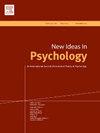Disconnected from complexity: on nature exposure, sociality, and the self-organizing self
IF 2.9
3区 心理学
Q2 PSYCHOLOGY, EXPERIMENTAL
引用次数: 0
Abstract
Connectedness to nature and connectedness in interpersonal relationships have both been shown to support human cognitive functioning as well as feelings of self-efficacy, well-being, and personal meaning. As modern urban lifestyles and digital-first sociality isolate us from natural environments and face-to-face connections, there is an associated reduction in these psychological markers of flourishing. One underexplored mechanism for this association is the way that built environments and digital social lives isolate us from appropriately challenging and perspective-shifting chance events and disorder which may be beneficial to our cognitive processes. This paper uses the lens of complexity science and self-organization to examine natural and social disconnection as disconnection from cognitively constructive complexity. It compares findings from multiple disciplines to propose that while built environments and digital isolation protect us from physical and social risks associated with chaotic systems, they also remove us from exposure to beneficial cognitive turbulences which may support positive perceptual shifts, psychological well-being, and meaningful self-expansion. Implications of this conceptualization for future research are also proposed.
脱离复杂性:关于自然暴露、社会性和自我组织
与自然的连通性和人际关系中的连通性都被证明支持人类的认知功能,以及自我效能感、幸福感和个人意义。随着现代城市生活方式和数字优先的社交方式将我们与自然环境和面对面的联系隔离开来,这些繁荣的心理标志也随之减少。这种关联的一个未被充分探索的机制是,建筑环境和数字社会生活将我们与适当的挑战和视角转换的机会事件和混乱隔离开来,这可能对我们的认知过程有益。本文从复杂性科学和自组织的角度来考察自然和社会的断裂,即从认知建设性复杂性的断裂。它比较了多个学科的研究结果,提出虽然建筑环境和数字隔离保护我们免受与混沌系统相关的物理和社会风险,但它们也使我们远离了有益的认知动荡,这可能支持积极的感知转变、心理健康和有意义的自我扩展。本文还提出了这一概念对未来研究的意义。
本文章由计算机程序翻译,如有差异,请以英文原文为准。
求助全文
约1分钟内获得全文
求助全文
来源期刊

New Ideas in Psychology
Multiple-
CiteScore
4.80
自引率
3.80%
发文量
37
期刊介绍:
New Ideas in Psychology is a journal for theoretical psychology in its broadest sense. We are looking for new and seminal ideas, from within Psychology and from other fields that have something to bring to Psychology. We welcome presentations and criticisms of theory, of background metaphysics, and of fundamental issues of method, both empirical and conceptual. We put special emphasis on the need for informed discussion of psychological theories to be interdisciplinary. Empirical papers are accepted at New Ideas in Psychology, but only as long as they focus on conceptual issues and are theoretically creative. We are also open to comments or debate, interviews, and book reviews.
 求助内容:
求助内容: 应助结果提醒方式:
应助结果提醒方式:


